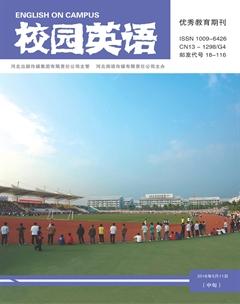Appreciation and comments on Professor Xu Yuanchong’s translation
张楠
【Abstract】Professor XuYuanchong is one of the most greatest translators in contemporary China.He founds the“Three beauties” theories and has made consistent efforts in translating ancient Chinese poems into English. The author here tries to analyze the beauty conveyed in Professor Xus translation of ancient Chines poetry .
【Key words】three beauty; Chinese poems; translation; poetry
Xu Yuanchong was born in Jiangxi province in the year 1921. He graduated from Tsinghua University in 1943 for foreign language studies and then studied abroad. After coming back to China, he worked as the English and French professor in some foreign languages schools. Since 1983 he has taught as a professor for international culture course at Peking University.
Professor Xu is very distinguished as a master who translates ancient Chinese poems into English. The contributions Professor Xu made to translation are invaluable and cannot be neglected. It is roughly estimated that up to now Professor Xu has published more than sixty books . And more than forty books of them are the very perfection of his lifetime translation practice, including mainly 600 Classical Chinese Poems, Golden Treasury of Chinese Poetry from Han to Sui,300 Tang Poems,300 Song Lyrics, Poems and Lyrics of Su Dongpo,150 Poems from Yuan to Qing, Romance of the Western Bower and Selected Poems of Mao Zedong.
Professor Xu creates the “three beauties” theories, that are “beauty in sense”, “beauty in sound” and “beauty in form”. These “three beauties” has been highly respected by scholars and translators at home and abroad.It would be an endless task to cite such living examples to prove that Xus translation has well conveyed the original beauty of the poetry in sense, sound and form. And as a beginner of this learning task, I have got the chance of appreciating beautiful English version of our Chinese classic poetry and at the same time learn a lot. And here are some of my thoughts, after reading professor Xus translation of the classical Tang poems.Jiang Xue is one of the most famous Iancient Chinese landscape poem, written by Liu Zongyuan. Professor Xu translates this poem like this.
江雪
千山/鸟飞/绝,万径/人踪/灭。
孤舟/蓑笠翁,独钓/寒江雪。
Fishing in Snow
From hill to hill no bird in flight;
From path to path no man in sight;
A sraw-cloakd man in a boat, to
Fishing on river clad in snow
The production of Chinese classic poetry is a kind of art. Jiang Xue is a typical example of Chinese Tang poetry of great artistic beauty. When this poetry is translated into English by Mr. Xu , the beauty of the poetry is not only to be reserved, but also to be embodied. Mr. Xu Yuanchong s translation of this short poem is also the very carrier of his theory of “Beauty in Sense, Sound and Form”.
“鸟飞绝”、“人踪灭”is translated respectively as “no bird in flight,“no man in sight”. Such translation didnt constrain themselves in the surface structure of the original language and is more suitable for the English expression. In the translated version ,the repeated emerge in the same syntactical structure of the first two sentences gives the reader a sense of loneliness and solitude. The translated version also has the quality of music and are full of fascinating allusions.
The production of Chinese classic poetry and lyric is a kind of art, which contains the beauty of artistic conception, temperament and form. When the Chinese classic poetry is translated into English, the beauty of the poetry and lyric is not only required to be reserved, but also to be embodied. In terms of the English translation of Chinese classic poetry, the reappearance of the “three beauties” is especially a difficult work.
It requires that the translator should has great translating skills as well as great literature skills. The well translated Chinese poetry , which well conveyed the “three beauties”can make the foreign reader appreciate the fascination of our Chinese language and at the same time learn about the spiritual connotation of our ancient Chinese poetry.

